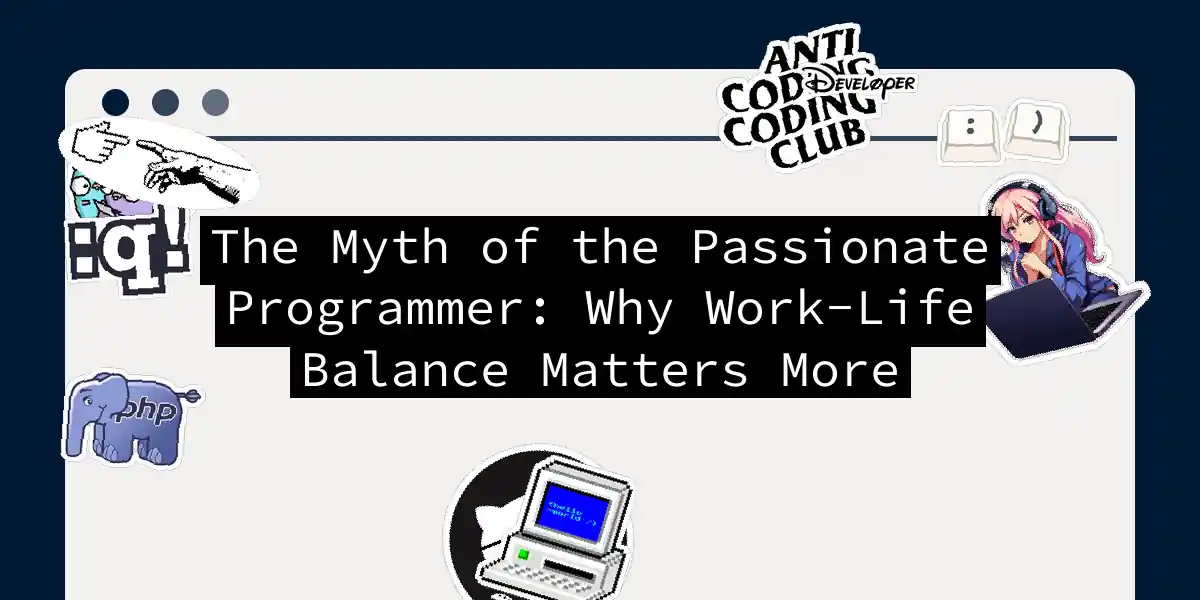The Allure of the Passionate Programmer
In the world of software development, there’s a pervasive myth that has been perpetuated for far too long: the myth of the passionate programmer who lives and breathes code 24/7. This idealized figure is often portrayed as someone who sacrifices sleep, social life, and even health for the sake of their craft. However, this narrative is not only misleading but also detrimental to the well-being and productivity of developers.
The Reality of Burnout
The truth is, excessive work hours and the constant pressure to perform can lead to burnout, a condition that is all too common among software developers. Burnout is characterized by physical, emotional, and mental exhaustion, and it can significantly impair a developer’s ability to work effectively[2].
The Myth of Work-Life Balance
The concept of work-life balance is often misunderstood. Many believe it means dividing your life into two distinct segments: work and personal life. However, this dichotomy is unrealistic and can lead to unnecessary stress. Instead of striving for a perfect balance, it’s more practical to focus on the quality of life as a whole[1].
Seasons of Life
Life is not static; it has seasons. There are times when work demands more of your time and energy, and times when personal life takes precedence. Recognizing these seasons and being flexible can help you navigate the demands of both work and personal life without feeling guilty or overwhelmed[1].
The Importance of Free Time
Free time is not a luxury; it’s a necessity. Regardless of how much you love programming, spending all your time coding can have negative consequences. Free time allows you to rest, recover, and maintain your passion and drive for coding without becoming overwhelmed[2].
Side Projects and Personal Growth
While side projects can be beneficial for learning new technologies and honing skills, they should not consume all your free time. It’s crucial to strike a balance between personal growth through side projects and enjoying other aspects of life. If your current job does not provide enough challenging work, it might be a sign that you need to reassess your career choices rather than filling all your free time with side projects[2].
Carefully Choosing Relationships
Maintaining a large number of relationships can be time-consuming and may leave you feeling like you don’t have enough time for anything else. It’s better to have a few strong, meaningful relationships that align with your professional and personal goals. This approach can free up time and improve the overall quality of your life[1].
How Companies Can Help
Software companies play a significant role in helping their employees achieve a better quality of life. By respecting employees’ leisure time and providing them with exciting and challenging work opportunities, companies can reduce the need for developers to seek side projects outside of work. Listening to developers’ opinions and assigning them to projects that help them grow professionally can also go a long way[2].
Red Lines and Boundaries
Setting clear boundaries, or “red lines,” is essential for maintaining a healthy work-life integration. For example, deciding not to miss bedtime with your children unless absolutely necessary can help you prioritize what’s important. Communicating these boundaries clearly to your workplace can ensure that you are supported in maintaining them[3].
The Productivity Myth
The idea that more hours worked translates to more productivity is a myth. Studies have consistently shown that working more than 40 hours a week leads to a decrease in productivity. This is true not just for software developers but for workers in various industries. The focus should be on working efficiently within reasonable hours rather than trying to clock in as many hours as possible[4].
Conclusion
The myth of the passionate programmer who sacrifices everything for code is not only unsustainable but also unhealthy. By focusing on the quality of life, recognizing the seasons of life, and setting clear boundaries, developers can maintain their passion for coding while enjoying a fulfilling personal life. Companies also have a crucial role in supporting their employees’ well-being by providing challenging work opportunities and respecting their leisure time.
In the end, it’s not about being a passionate programmer 24/7 but about being a well-rounded individual who finds joy and fulfillment in both work and personal life. So, the next time you’re tempted to pull an all-nighter to meet a deadline, remember: your life is more than just code.
